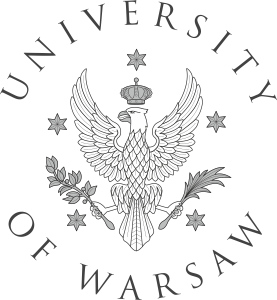25 maja 2020
The Centre of New Technologies invites to a webinar by
Prasanna Venkatesh Rangadurai, PhD
Bruker Daltonics, Bremen, Germany
Title: From Academia to Industry – Realizing your skillset.
Date: 29th May 2020 (Friday)
Time: 12:00 pm
Virtual seminar: here
Password: cent (the password will be filled in automatically)
Information for webinar attendees
Host: Dr Savani Anbalagan
How to prove your experience and relate to the requirements of the industry? As daily researchers, one is indulged too deeply in solving the mysteries of science focusing on specific topics. However, you can still translate your skills to meet industrial demands. In this webinar, I would like to explain what mistakes I made during my transition to the industry and help you avoid these. Understanding how to translate your current skill set is a key factor that will help you identify which opportunity to target. „Where do you want to see yourself in 5 years?” This is one of the most common and irritating questions that HR would ask. However, it is important to know the answer. By the end of the webinar, I am sure you will start foreseeing your future and be prepared for your successful leap into the industry.
22 maja 2020
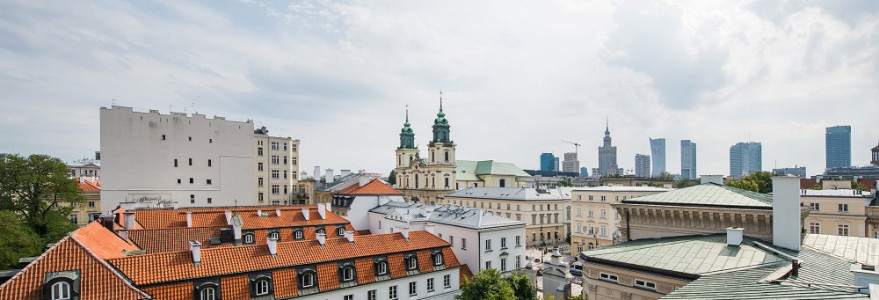
Soon the UW rector’s election for the 2020-2024 term will be held. On 21st May, the University Electoral Committee registered three candidates. On 25th May at 16:00, the candidates will present their programmes and answer questions, during the online pre-election meeting with members of the UW academic community. One can watch the debate on the University of Warsaw website, which will also be simultaneously interpreted.
The University of Warsaw rector election by the UW Electoral College will be held on 17th June.
On 21st May, the University Electoral Committee registered three candidates for that position:
– Prof. Alojzy Z. Nowak, www: http://alojzynowak.pl, Twitter: https://twitter.com/AlojzyZNowak;
– Prof. Paweł Strzelecki, www: https://www.pawelstrzelecki.pl, Twitter: https://twitter.com/Pawe1Strze1ecki;
– Prof. Andrzej Tarlecki, www: https://tarlecki.pl, Twitter: https://twitter.com/AndrzejTarlecki.
All of them will take part in the pre-election meeting which will be held remotely on the UW YouTube channel on 25th May at 16:00.
One can watch the debate on the University of Warsaw website. The link to the live stream in Polish is available here >>
The meeting will also be simultaneously interpreted. The link to the English version of the live stream will be available on 25th May at en.uw.edu.pl.
During the meeting, the candidates for the UW rector will present their programmes and answer the selected questions. Every member of the UW community can ask one question and send it within one application. Please formulate your question clearly and succinctly – so that it can take no more than two minutes to read it.
Questions should be sent to the address: ukw(at)uw.edu.pl – until the end of the last presentation during the meeting on 25th May. There will be up to seven questions drawn.
Source: www.en.uw.edu.pl
21 maja 2020
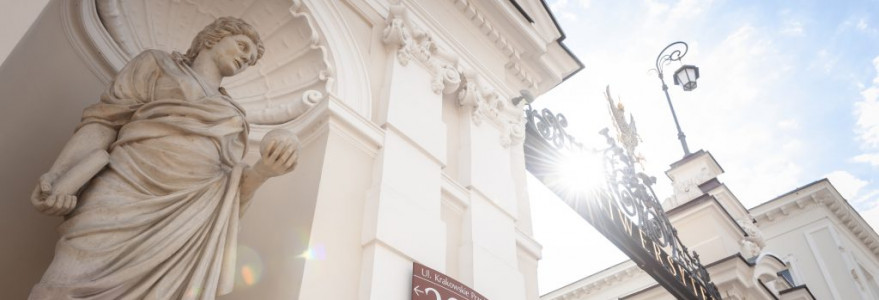
Following the new ordinances of the UW rector, online teaching and learning will continue, except classes which cannot be conducted remotely. It is possible to work remotely, perform work on a roster basis or under the flexible working–time system. On 26th May, Prof. Marcin Pałys issued an ordinance which introduces changes – specifies – some of the provisions of the document published on 21st May. The health, safety and well-being of members of the UW community remain the university’s priority.
Both ordinances issued by the rector include rules for studying and working at UW. Measures brought in by UW aim to prevent the spread of COVID-19 among the UW community.
Taking into consideration the current situation in the country, Prof. Marcin Pałys, the UW rector, has decided to introduce the following changes regarding:
EDUCATION:
- Online classes for students, doctoral candidates, post-diploma learners will be extended until the end of 2019/2020 academic year;
Exception: Classes which need to be conducted on-site, e.g. laboratory classes or practical classes;
- Practical classes schedules being part curricula will be introduced;
- Student camps and summer schools, which are not conducted remotely, are suspended;
- The foreign language proficiency examinations should be conducted according to the University Council for the Certification of Language Proficiency’s resolution, as of 18th May, regarding the organisation of the foreign language proficiency examinations for the summer examination session of the academic year 2019/2020;
- Doctoral examinations in proceedings aimed at awarding the doctoral degree, instituted by 30th April 2019, in the primary discipline corresponding to the topic of the doctoral dissertation, additional discipline and a modern foreign language, as well as examinations in the scientific discipline, in proceedings aimed at awarding the doctoral degree, instituted after 30th September 2019 are conducted only remotely until the end of 2019/2020 academic year;
- Defence of doctoral dissertations and habilitation colloquia will be conducted only remotely until the end of the 2019/2020 academic year;
- Exams conducted on-site are suspended;
- Education within the framework of post-graduate programmes conducted at the premises of the University of Warsaw are suspended until the end of the 2019/2020 academic year. Head of a unit can decide to continue education in the 2019/2020 academic year remotely.
WORK:
- Employees can work remotely;
Exception: Staff whose work determines safety and health of work of members of the University community or continuity of the functioning of the university and protection of its assets.
- There is a possibility to perform work on a roster basis or under the flexible working–time system;
Heads of units make decisions on the organisation of work in their units.
Regulations being still in force:
- Suspension of business travels abroad and participation in domestic conferences of employees, doctoral candidates, students and post-diploma learners of the university. It applies until 30th June;
- Cancellation of open events such as conferences, symposiums, lectures, including courses of the Open University of the University of Warsaw, artistic performance sand other meetings of this type organised by the University of Warsaw as well as events organised by external entities at the premises of the University of Warsaw. It applies until 31st August;
- Suspension of accommodating new students in residence halls and other facilities, and prohibition from visiting these places by external guests. It applies until 30th June.
The rector’s order also includes information on:
- The operations of UW premises such as the University of Warsaw Library, sports facilities, creche, kindergarten or canteen;
- Instruction what to do in case of suspected coronavirus cases among students, doctoral candidates and employees.
View:
In line with rector’s order as of 21 May, all employees, doctoral candidates and students are obliged to comply with the Chief Sanitary Inspectorate’s guidance, instructions and recommendations issued by the rector, chancellor and heads of university units.
Due to the changing situation, we recommend you to follow the UW website, where you can find information on:
- The organisation of foreign language certification exams;
- Adjusted academic schedule;
- Rules for conducting examinations remotely;
- Remote defense of theses.
Source: www.en.uw.edu.pl
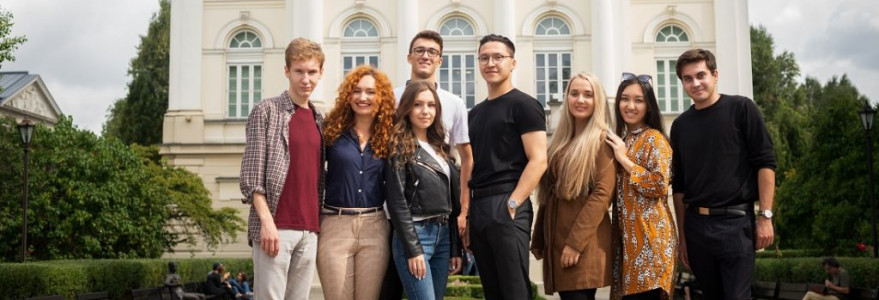
If you think about studying at the largest university in Poland and a leading research centre in the country, you should definitively choose a study programme offered by our university.
The University of Warsaw provides over 100 programmes of 1st, 2nd and long cycle (uniform) Master’s studies in humanities, social sciences, exact and natural sciences, including programmes taught in English and programmes conducted jointly with international universities. Our teaching staff includes many experienced and recognised lecturers.
Doctoral education is conducted in 33 fields of doctoral studies and in four newly-established doctoral schools (of humanities, social sciences, exact and natural sciences, and interdisciplinary). Find out more about the application process to our doctoral schools >>
UW is listed in the international rankings of universities, which rank a small percentage of the world’ s best universities (Academic Ranking of World Universities, QS World University Rankings). In 2019, the university performed very well in Shanghai’s Global Ranking of Academic Subjects (GRAS 2019), which included ten scientific disciplines taught at the university. Mathematics and Physics were ranked 51-75 worldwide in their categories, respectively.
The university works together with over 680 international entities from over 100 countries under direct bilateral cooperation agreements. One of our strategic initiatives is the 4EU+ Alliance. More information on 4UE+ >>
Besides getting education from the best academic staff in the country, our students have an opportunity to engage in ambitious research projects, develop their talents by participating in international contests and receive grants and scholarships. There are lots of sports activities and cultural initiatives.
Currently, the admissions schedule is being adjusted. Information on the application process and entrance requirements will be available in our Online Recruitment (IRK) system.
Source: www.en.uw.edu.pl
19 maja 2020
Project Manager – prof. Karol Grela (Head of Organometallic Synthesis Laboratory, Faculty of Chemistry, University of Warsaw) is looking for candidates to work in a scientific project: „Making the Impossible Possible: Macrocyclisation of Unbiased Dienes at High Concentration by Ring-Closing Metathesis”, programme Opus supported by National Science Centre positions: PhD student (1). Deadline for applications: 9 June 2020. For more info see >> pdf
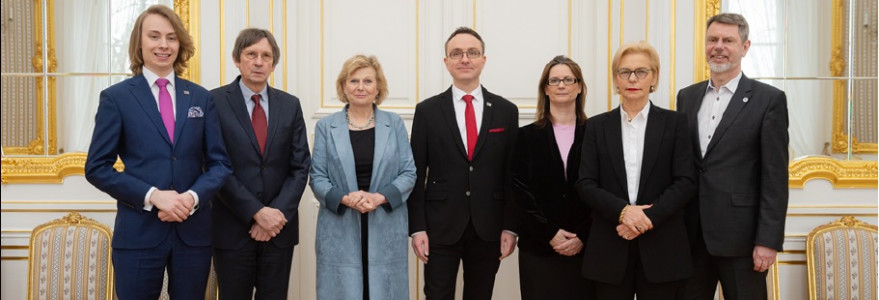
The first University Council of the University of Warsaw was established by the decision of the Senate of the University of Warsaw in May 2019. The work schedule of the council for 2019 included five meetings.
The council gives its opinion on the draft university strategy, draft statute, and the report on the implementation of the university strategy. Also, it is responsible for university financial management monitoring, university management monitoring, and appointing candidates for the rector, after obtaining the opinion of the senate.
Works of the University Council concentrated in 2019 both on current issues related to the activities of the University and on the strategy for further development of the University of Warsaw.
Annual Report of the University Council, 2019
For more information, please visit: radauczelni.uw.edu.pl/en.
Source: www.en.uw.edu.pl
18 maja 2020
The Centre of New Technologies invites to a webinar by
Anna Malik, PhD
Nencki Institute of Experimental Biology, Warsaw
Title: New players in glia biology: VPS10P proteins as sorting receptors in astrocytes.
Date: 22th May 2020 (Friday)
Time: 12:00 pm
Virtual seminar: here
Password: cent (the password will be filled in automatically)
Please use the „Join by browser” option. The Webinar link is also on CeNT webpage (https://cent.uw.edu.pl/en/blog/anna-malik-phd-nencki-institute-of-experimental-biology-warsaw/). Please find The information for webinar attendees attached.
Information for webinar attendees
Host: Dr Savani Anbalagan
VPS10P domain receptors – How to sort out brain health and disease
VPS10P domain receptors are intracellular sorting receptors primarily recognized for their roles in neuronal cells. They direct cargo proteins to their destined localization in subcellular compartments of the cell. Sorted proteins include signaling receptors and transporters but also secreted growth factors and morphogens. Protein sorting by VPS10P domain receptors controls functional integrity and viability of neurons, while receptor dysfunctions are linked to acute, psychiatric, and neurodegenerative diseases. Now, the dogma of exclusive neuronal expression of VPS10P receptors in the brain was challenged by several studies, drawing our attention to receptor activities in non-neuronal cell types, i.e. astrocytes and microglia, in pathologies of central nervous system. Here, I will present major concepts in VPS10P research, but I will also focus on the newest advancements regarding non-neuronal functions of VPS10P receptors in the brain.
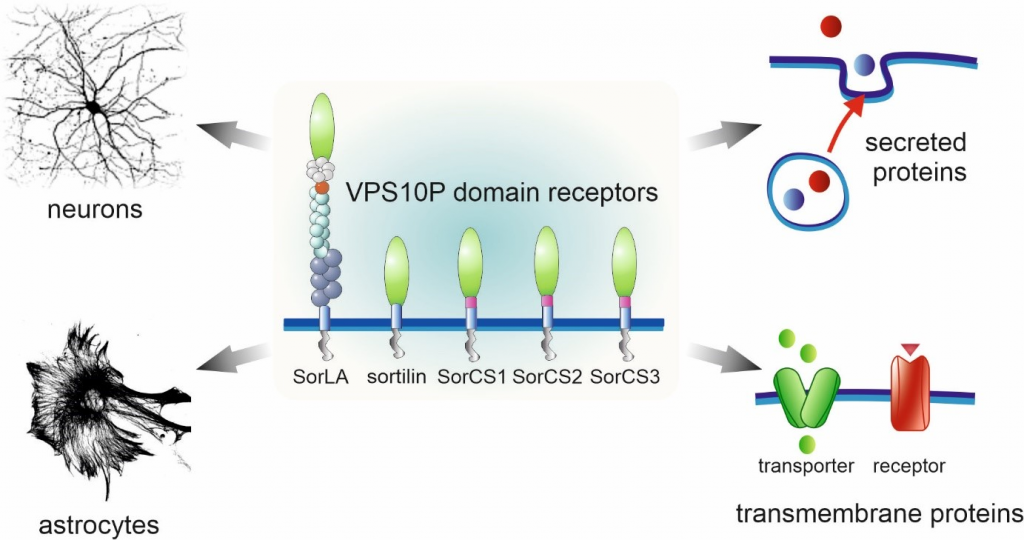
15 maja 2020
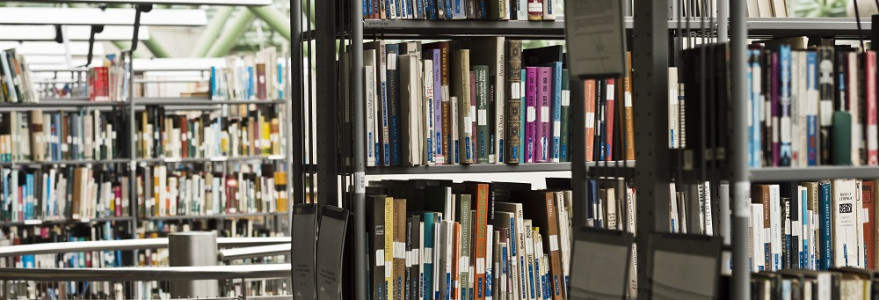
As a result of easing restrictions related to the coronavirus pandemic, readers can partly use the University of Warsaw Library (BUW) resources. As of 18th May, BUW resumes lending, free scanning services, and individual appointments with readers.
Starting from 18th May (until further notice), students, doctoral candidates and employees of UW can lend books and scan materials. The Circulation Desk of the library will be temporarily located in the restoration room on the ground floor of the building (room 085). It will be open to readers from Monday to Friday from 9 am to 6 pm (except public holidays). If you would like to lend books, please follow the rules published on the BUW website.
Individual appointments with readers are possible, however, it is obligatory to agree with the BUW employees the purpose, date and time of appointments. Making an appointment in advance is mandatory.
Free scanning
As of 18th May, students, doctoral candidates and employees of UW, who have an active library account at the library, have no overdue library (BUW) materials and no fees charged by the University of Warsaw Library, can order scanning of the materials. More information >>
Safety rules
All readers are obliged to apply the Chief Sanitary Inspectorate recommendations and comply with the principles during their stay at the University of Warsaw Library. Find out more >>
The return date for all books borrowed so far is postponed to 30th May.
Source: www.en.uw.edu.pl
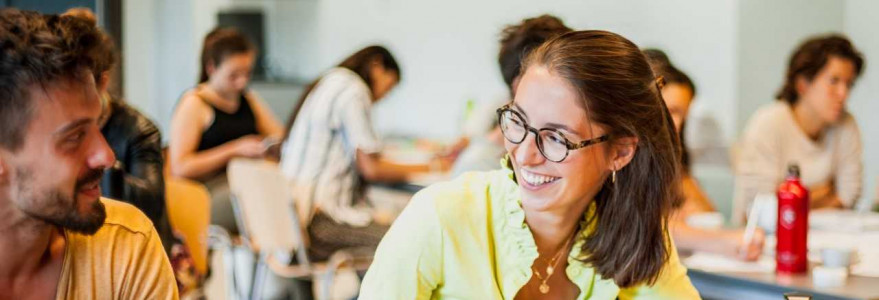
Academics working in the 4EU+ universities can submit project proposals regarding education that would engage students and doctoral candidates. All projects have to involve at least three 4EU+ member universities and fall under one of the four 4EU+ flagship programmes.
The collaboration within 4EU+ will be marked by a shared approach to higher education that is being developed. For now, its main features are:
- Challenged-based, addressing key challenges and problems that our societies are facing, often in an interdisciplinary way, and engaging with the public;
- Student-centred, allowing and encouraging students to develop a personalised learning pathway, following their curiosity and questions and engaging in active learning;
- Knowledge-centred, understanding learning as research and asking academics to integrate their research into their teaching;
- Competence-oriented, cultivating a set of competences and skills that each 4EU+ student should be able to demonstrate.
Academics of 4EU+ are invited to submit project proposals that can have various forms, e.g. workshops and other short-term intensive learning experiences (summer/winter schools), seminars, joint courses and modules, core curricula, or joint study programmes. All of them need to be daring and innovative.
Project proposals need to be rooted in the 4EU+ Flagship Programmes:
- Health and demographic change in an urban environment;
- Europe in a changing world: Understanding and engaging societies, economies, cultures and languages;
- Transforming science and society by advancing information, computation and communication;
- Biodiversity and sustainable environment.
Proposals for educational projects should be submitted between 15th June and 1st July.
At first, they need to be are handed in digitally to the local 4EU+ office. At UW, the office responsible for the collaboration with the 4EU+ universities is the Office for International Research and Liaison (please e-mail: marta.brelih-wasowska(at)adm.uw.edu.pl and marta.jaworska-okninska(at)adm.uw.edu.pl).
Proposals are evaluated by the responsible Flagship Programme Committee and then approved/rejected by an expert group on education and the 4EU+ Secretary General.
The local EU+ officers will inform the applicants about the outcome, alongside with further information on the development of the project in practical terms (also finances).
More information >>
Source: www.en.uw.edu.pl
14 maja 2020
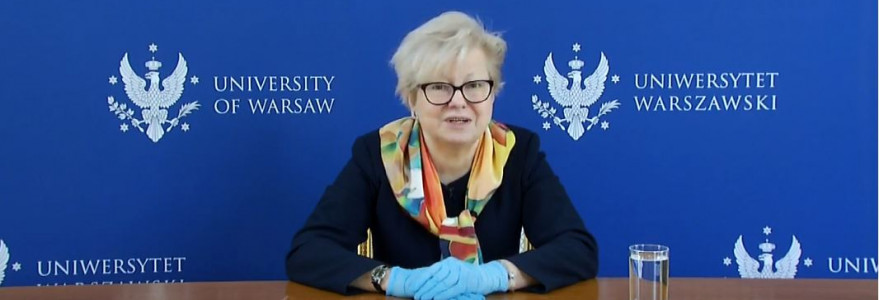
The adjusted academic schedule, conducting remote exams, and online thesis defence are only a few examples of subjects raised during an online meeting with the UW Vice-Rector for Student Affairs and Quality of Teaching, Prof. Jolanta Choińska-Mika.
More than 250 questions regarding teaching and learning at the University of Warsaw and student matters had been sent by members of the UW community before the meeting. During the two-hour Q&A session, Prof. Choińska-Mika informed about the way of dealing with various aspects of education in the coming months. She underlined that safety remains a priority for UW. If there is a possibility to move classes, exams and other activities online, we all should follow this to limit unnecessary transportation and congregation of people. The Vice-Rector also acknowledged an effort of both academics and students in conducting good quality online classes.
The academic schedule
The exam session has been extended until 23rd August and divided into 3 blocks, lasting the same amount of days. Take a look at the adjusted timetable >> The UW Vice-Rector for Student Affairs and Quality of Teaching ensured that the university authorities made it possible to individualise the examination session department by department. The majority of units opt for the first and second block of the exam session. However, the situation varies from department to department. One should follow the information posted on an individual website of a unit.
The 2020/2021 academic year is being prepared to be on-site teaching and learning. However, it all depends on the situation due to coronavirus.
Remote examinations and certification of language skills
It is possible and recommended to conduct online exams. However, it is essential to reach a consensus on that. When there is a case of digital exclusion, students or doctoral candidates cannot participate in a given activity, lecturers should attempt to find an appropriate solution and be flexible. All UW academic teachers and students have their Google email accounts, therefore it is possible to use, e.g. Google Meet.
However, there are also practical classes, being part of curricula, that will have to be conducted on-site, e.g. laboratory classes.
On 25th May, there will be detailed instructions on conducting language exams, that certify language skills.
Admissions process
The UW timetable is adjusted to the changing situation. The phase of admissions for BA studies is extended. August and September constitute two months when the admissions will be conducted. The University of Warsaw will move deadlines, so BA and MA students will have an opportunity to defend their theses, submit their applications, and become students or doctoral candidates of UW.
Residence halls
Those who live in the UW residence halls will pay the reduced accommodation fee. If you face financial problems due to the coronavirus, please not that you can apply for special grants. More information >>
In case of any difficulties, please contact the head of your unit or deputy dean for student affairs. If you need psychological support, feel free to contact the UW Psychological Counselling Centre. More information >>
Watch the simultaneous interpretation of the meeting that was held on 14th May on the University of Warsaw YouTube channel.
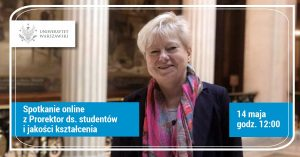
Source: www.en.uw.edu.pl

